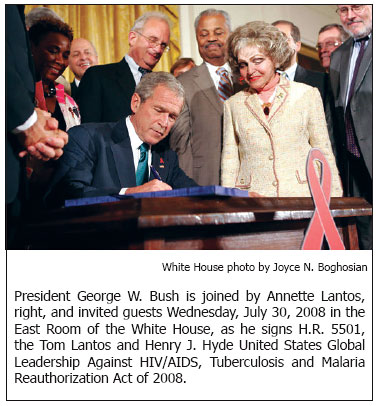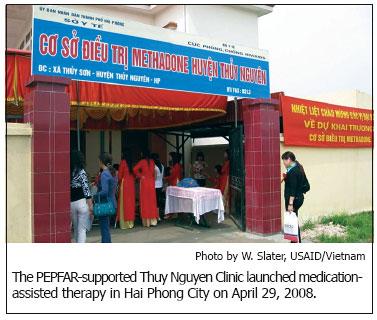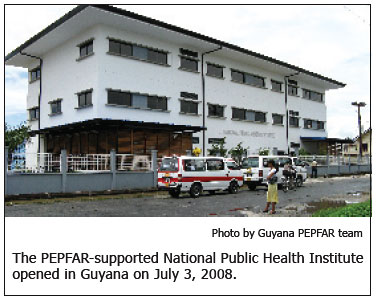|
|
Inside this Edition:
President Bush Signs Law Reauthorizing PEPFAR [more]
In Mozambique, Junior Theatre Group Promotes HIV/AIDS Awareness [more]
New Services to Fight Drug Addiction Available in Vietnam [more]
National Public Health Laboratory Opened in Guyana [more]
|
President Bush Signs Law Reauthorizing PEPFAR

On July 30, 2008, President George W. Bush signed into law H.R. 5501, the Tom Lantos and Henry J. Hyde United States Global Leadership Against HIV/AIDS, Tuberculosis and Malaria Reauthorization Act of 2008. This legislation responds to the President’s call last year to expand the U.S. Government commitment to this successful program for five additional years, from 2009 through 2013.
In 2003, President Bush launched the U.S. President’s Emergency Plan for AIDS Relief (PEPFAR) to combat global HIV/AIDS – the largest commitment by any nation to combat a single disease in history.
This legislation will increase the U.S. financial commitment to the fight against global HIV/AIDS, tuberculosis, and malaria, authorizing up to $48 billion to combat the three diseases, including: $39 billion for PEPFAR bilateral HIV/AIDS programs and U.S. contributions to the Global Fund to Fight HIV/AIDS, Tuberculosis and Malaria; $5 billion to the President’s Malaria Initiative to fight malaria through bilateral programs around the world; and $4 billion for bilateral programs to fight tuberculosis, which is the leading killer of Africans living with HIV.
When President Bush launched PEPFAR in 2003, approximately 50,000 people in sub-Saharan Africa were receiving antiretroviral treatment. Today, PEPFAR supports lifesaving treatment for over 1.7 million people worldwide, the vast majority of them in sub-Saharan Africa.
PEPFAR has also supported care for more than 6.6 million people, including 2.7 million orphans and vulnerable children. To date, PEPFAR has allowed nearly 200,000 children to be born HIV free. |

|
“These statistics are promising. Yet there is no way to quantify PEPFAR’s greatest achievement: the spread of hope,” President Bush said.
Under the new legislation, PEPFAR will increase its treatment, prevention and care goals. Working in partnership with host nations, PEPFAR will support treatment for at least 3 million people; prevention of 12 million new infections; and care for 12 million people, including 5 million orphans and vulnerable children.
To meet these goals, PEPFAR will support training of at least 140,000 new health care workers in HIV/AIDS prevention, treatment and care.
“The men and women will continue to help Africa curb HIV epidemics -- along with many other health care challenges that the continent faces,” according to the White House.
Along with providing medical care, the bill also aims to reduce the deadly stigma of HIV/AIDS.
“As more people get treatment, we will show the world that it is possible for people to live positively with HIV while making important contributions to their communities,” said President Bush.
The U.S. Government, through PEPFAR, will help to bolster multilateral efforts by continuing to engage international organizations as partners and to put accessibility, quality and sustainability at the center of all HIV/AIDS work. This complex effort requires close cooperation with the Global Fund to Fight AIDS, Tuberculosis and Malaria; the Joint United Nations Programme on HIV/AIDS (UNAIDS); and other international partners. |

|
“Today the United States is the largest contributor to the Global Fund to Fight AIDS and Tuberculosis and Malaria. The bill maintains our commitment to this program. It will bring greater transparency and accountability to the Fund’s vital work. The bill also demonstrates that the United States is keeping its promises to fight HIV/AIDS. Today America calls on other nations, particularly the G8, to honor the commitments they have made as well,” President Bush said.
At the bill signing ceremony, President Bush concluded his remarks by recognizing two HIV-positive attendees from Uganda, Agnes Nyamayarwo and Mohamad Kalyesubula.
“Agnes lost her husband and son to AIDS, and is HIV-positive herself. Yet with the support from PEPFAR, Agnes has turned her grief into action. She has traveled the world educating others about this disease,” said President Bush. “By the time Mohamad was diagnosed, he had been bed-ridden for an entire year with HIV/AIDS. His immune system was almost wiped out. Yet antiretroviral treatment he received at a clinic supported by PEPFAR has helped his health improve. ...I met him my first trip to Africa shortly after his diagnosis. He told me he had a dream, which was to come to the White House. Here you are, brother. Welcome.
“Agnes and Mohamad are proof of what many in Africa call the Lazarus effect: Communities once given up for dead are brought back to life.” |
In Mozambique, Junior Theatre Group Promotes HIV/AIDS Awareness

Through theater, seven young boys, ages eight through 14, are encouraging abstinence, behavior change and promoting healthy lifestyles in an effort to prevent the spread of HIV/AIDS in Mozambique’s Angonia district.
These boys were first drawn to the stage after seeing a group of the district’s senior boys perform an interactive production about HIV/AIDS prevention, supported by the U.S. President’s Emergency Plan for AIDS Relief (PEPFAR). Inspired by their elders’ performance and message, the young boys formed the “Junior Theatre Group of Angonia.”
The PEPFAR-supported Junior Theatre group hosts performances about HIV/AIDS and its impact on issues including gender, children’s rights, family relationships and friendship. The play is an educational, interactive performance that emphasizes behavior change as a means to prevent the spread of HIV/AIDS.
Throughout the performances, members of the audience are encouraged to provide scenarios and ask questions about HIV/AIDS. The boys use these questions on stage and incorporate the answers into their act in hopes of promoting safe sexual behavior and conduct. Speaking about the program, Junior Theatre Group member Francelino Issufo says, “We like to do theater about abstinence. This is the only way that people understand that this is a unique way to protect themselves from HIV/AIDS.” |

|
New Services to Fight Drug Addiction Available in Vietnam

Vietnamese addicted to heroin in Hai Phong and Ho Chi Minh City will now have a better chance to break the cycle of drug addiction thanks to a new cost-effective, community-based service made available by the Government of Vietnam, with support from the U.S. President’s Emergency Plan for AIDS Relief (PEPFAR) and other international partners.
Since 2005, the U.S. Government and other international partners and organizations have advocated for the introduction of medication-assisted therapy (MAT) using methadone to treat heroin addiction. And now, the Party Commissions, the National Assembly, and the Peoples’ Committees in Hai Phong and Ho Chi Minh City, including local health departments, have made MAT a reality in Vietnam.
Fifteen hundred heroin addicts will benefit from the Government of Vietnam’s Methadone Pilot Program, and the results of this program will guide future efforts to expand to other Vietnamese communities.
According to Dr. David Jacka from the World Health Organization, MAT “has been proven in numerous countries worldwide, including Vietnam’s neighbors in Asia, to reduce crime and opioid drug use, reduce the demand for drugs, and reduce the risk for HIV transmission.” |

|
With international attention focused on this effort, Ambassador Mark Dybul, PEPFAR Coordinator, congratulated the Government of Vietnam for initiating the MAT program.
The U.S. Government, along with the United Kingdom’s New Services to Fight Drug Addiction Available in Vietnam Department for International Development, the World Bank, and many other groups, has supported the Government of Vietnam in the planning, development, and implementation of this initiative.
On April 29, 2008, the first outpatient clinic providing MAT to both HIV-positive and HIV-negative individuals was opened at the PEPFAR-supported Thuy Nguyen Clinic in Hai Phong, a port city where half of heroin injectors are living with HIV/AIDS. |
National Public Health Laboratory Opened in Guyana

With support from the U.S. President’s Emergency Plan for AIDS Relief (PEPFAR), a new public health laboratory opened in Guyana on July 3, 2008. The National Public Health Institute is expected to become a national and regional center of excellence for lab standards and research in Guyana.
The Institute’s new equipment gives in-country health professionals the ability to test for resistant strains of TB and HIV that were previously elusive in other labs. Not only will this new facility allow the country to detect these once-obscure viruses, but it will accelerate the pace at which HIV/AIDS is identified.
“When an infant is born, it can now be tested for the virus within weeks, not years, thereby allowing an earlier diagnosis, and the promise of life-saving therapy,” said Dr. LaMar Hasbrouck, Centers for Disease Control and Prevention (CDC) Director in Guyana.
The lab is a continuation of the significant progress Guyana has made within its health care system. In 1990, the country was spending a mere US$6 per capita on health care. Today, the government provides an average of US$78 per capita on health services.
“For any country and more so a poor country...this is an achievement that is commendable,” said Guyana’s Minister of Health, Dr. Leslie Ramsammy. |

|
|




 PDF version
PDF version